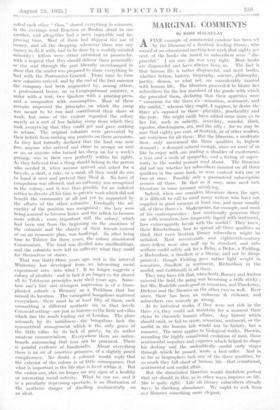MARGINAL COMMENTS
By ROSE MACAULAY
AFINE example of commercial candour has been set by the librarian of a Scottish lending library, who owned at an educational meeting last week that eighty per cent. of the books she issued to subscribers were " dis- graceful." I am sure she was very right. Most books are disgraceful and have always been so. The fact is that human life is rather disgraceful, and most books, whether fiction, history, biography, science, philosophy, poetry, drama, or what not, arc considerably tainted with human life. The librarian proceeded to blame her subscribers for the low standard of the goods with which she provided them, declaring that their appetites were " voracious for the three s's—sensation, sentiment, and the sordid," whereas they ought, I suppose, to desire the three p's opposed to these—placidity, practicality and the pure. She might easily have added some more s's to her list, such as salacity, scurrility, scandal, slush, squalor, shockingness, sex, and the silly ; for we may be sure that eighty per cent. of Scottish, as of other readers, are voracious for all these. But the librarian, a moderate Scot, only mentioned the three qualities in highest demand ; a demand natural enough, since we most of us like to enjoy with our reading a shudder of excitement, a tear and a smile of sympathy, and a feeling of super- iority to the sordid persons read about. The librarian did not say whether her subscribers insisted on all three qualities in the same book, or were content with one or two at once. Possibly only a guaranteed subscription secures all three. Be that as it may, none need lack literature in some measure satisfying.
Indeed, when one considers literature down the ages, it is difficult to call to mind many writers who have not supplied in good measure at least one, and more usually all, of these three s's, Shakespeare, for example, and most of his contemporaries : how continually generous they are w ith sensation, how frequently liquid with sentiment, how extravagantly lavish with the sordid ! They knew, these Elizabethans, how to spread all three qualities so thick that even Scottish library subscribers might be satisfied. Most seventeenth- and eighteenth-century story-tellers were also well up to standard, and sub- scribers could safely ask for a Behn, a Defoe, a Fielding, a Richardson, a Smollett or a Sterne, and not be disap- pointed ; though Fielding gave rather light weight in sensation, Smollett in sentiment, Richardson in the sordid, and Goldsmith in all three. They may have felt that, when Scott, Burney and Austen entered the field, the going was becoming a trifle sticky ; but Mrs. Radcliffe made good on sensation, and Thackeray, Dickens and the Brontes on the other two as well. Ever ' since, there has been an embarras de richesses, and subscribers can scarcely go wrong. As to historical works, if they were not rich in the three s's, they could not maintain for a moment their claim to chronicle human affairs. Any history which should omit, or fail to stress, sensation, sentiment, or the sordid in the human tale would not be history, but a romance. The same applies to biological works. Darwin, recording the highly sensational evolution of man, those sentimental impulses and vagaries which helped to shape his destiny and the undoubtedly sordid early stages through which he passed, wrote a best-seller. And in so far as biographers lack any of the three qualities, by so much they fall short of human life—that sensational, sentimental and sordid affair.
But the dissatisfied librarian would doubtless protest that art should, in this, as in other ways, improve on life. She is quite right. Life all library subscribers already have, in shocking abundance. We ought to seek from our libraries something more elegant.


































 Previous page
Previous page